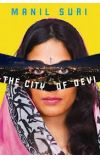
09 Apr 2013 02:18:59
India has been invaded by China, its troops pouring through the northeastern frontier, and then by Pakistan. The UN forced the withdrawal of China (acting in concert with Pakistan all along), but Pakistan stayed put. Then cyber-attacks disabled many institutions, including computer networks, so that mobile phones and the internet packed up. In these circumstances, with nuclear warfare looming, no reaction can be described as normal, but fixation on the powers of fruit is a hard one to share.
The thriller aspect has been well plotted, but its horrific aspects must be downplayed if the romantic triangle is to remain the focus. Set pieces become sketchy and even massacres arouse little reaction. Providential turns of event reliably rescue the main characters, as if this was a romp, though, not a comedy.
Sarita's narrative alternates with contributions from a Muslim man named Ijaz ("Jaz" or "the Jazter"). Jaz too is obsessed with finding Karun, and shadows Sarita across Mumbai, intent on following her clues and getting to him first. He's an ex-lover of Karun's, rejected after he reverted to his previous type and was unfaithful.
Indian homosexuality is enough of a taboo subject that it's bracing to read about Jaz's happy days of cruising in Hyderabad, where he would never know what language his partners might use at the moment of orgasm, quite possibly Urdu or Telegu or a mix of both ("only the techies came in English"). Yet the sexual psychology is always thin. It's not just that Jaz is an amoral predator redeemed by his love for a nice physicist, it's that his amoral predation was accompanied by an unwavering commitment, however frantic the carnal context, to safe sex. Here Manil Suri seems to be backing away, presumably to avoid reinforcing negative stereotypes, from the destructiveness that is just as much a part of homosexuality as of heterosexuality. Snooky, the incongruous lady-boy Muslim (and terrorist fellow-traveller) narrator of Timothy Mo's recent Pure, is a much more complex creation, and much more alive.
Karun is hardly even a sketch for a character. His attraction for Sarita is bound up with "the passivity at the core of his being, his need to be a conduit", but for the reader he seems closer to a blank. When Sarita refers to him as "the third vertex in our triangle", it seems all too accurate. He's part of a design not a drama.
There's a rather self-conscious passage early in the book in which Karun lectures Sarita on the Trimurti, the Hindu trinity of Vishnu, Shiva and Brahma, representing forces of preservation, destruction and creation. It's self-conscious because Karun, who proposes substituting Devi for Brahma, does so in a novel with Devi in its title by an author whose previous novels are The Death of Vishnu and The Age of Shiva. This mechanism serves to neutralise the most interesting element in the book by offering a symbolic resolution, with forces balanced "as evenly as the particles in an atom", a new trinity combining male and female, Muslim and Hindu, gay and straight. Readers of The City of Devi are encouraged to look beyond the sordid details, like queasy museum visitors being reassured by the curator that apparently pornographic sculpture really only represents the harmony of the cosmos.

